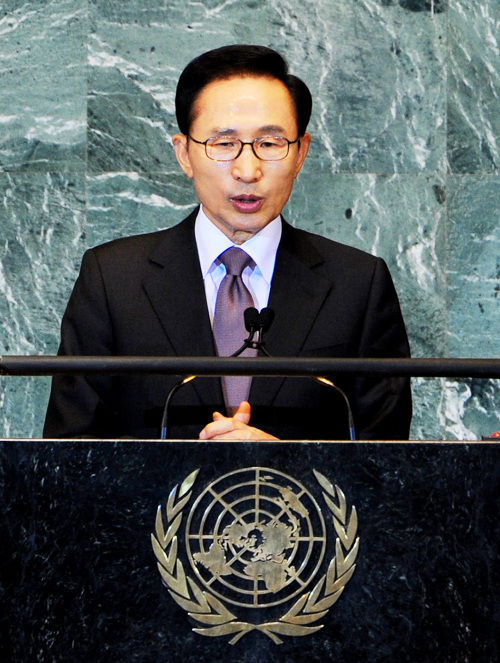NEW YORK (Yonhap News) -- South Korean President Lee Myung-bak urged North Korea Wednesday to break its self-imposed isolation and join the international community by forsaking its nuclear ambitions, declaring that Seoul is ready to help its impoverished neighbor if it makes the strategic decision.

(Yonhap News)
Lee's appeal, made in a keynote speech at the U.N. General Assembly, came hours after the nuclear envoys of the two Koreas produced no breakthrough in talks in Beijing to pave the way for reopening the six-party talks on ending Pyongyang's nuclear programs.
Officials said the South demanded the North take some preemptive measures to back up its denuclearization pledge before resuming the six-party talks, but the North reiterated a call for the resumption of the nuclear talks with no strings attached.
"The North Korean nuclear threat poses significant challenges to peace on the Korean Peninsula, Northeast Asia and beyond," Lee said, adding that South Korea has tried for the past 20 years to end Pyongyang's nuclear ambitions and will continue to do so.
"It is my hope to see the DPRK enjoy peace and prosperity by becoming a responsible member of the international community. When the DPRK chooses the path to mutual benefit and common prosperity, we will be ready to help in this endeavor along with the international community," he said.
DPRK stands for the Democratic People's Republic of Korea, the North's official name.
U.S. President Barack Obama also warned North Korea that it will face "greater pressure and isolation" should it continue nuclear weapons development and hostile actions against South Korea.
"North Korea has yet to take concrete steps towards abandoning its weapons, and continues belligerent action against the South,"
Obama said during a speech at the U.N. General Assembly. "If they continue down a path that is outside international law, they must be met with greater pressure and isolation. That is what our commitment to peace and security demands."
Lee also called for the international community to step up its fight against terrorism and the spread of weapons of mass destruction, such as nuclear, biological and chemical weapons and long-range missiles.
"The greatest threat of all perhaps emanates from nuclear terrorism. International cooperation is now needed more than ever to prevent nuclear terrorism," he said, adding that the issue will be a top issue at next year's Nuclear Security Summit in Seoul.
The keynote speech was the centerpiece of Lee's three-day trip to New York from Tuesday. He is also scheduled to attend a high-level meeting on nuclear safety on Thursday to call for expanding atomic energy to fight climate change despite concerns in the wake of Japan's nuclear disaster.
Upon arrival Tuesday, Lee also received the World Statesman Award by the Appeal of Conscience Foundation. In an acceptance speech, Lee also urged the North to give up its nuclear programs, saying denuclearization is a key first step toward eventual unification of the divided states.
Lee's attendance at the General Assembly -- his first since 2009 -- comes as South Korea marks the 20th anniversary of its admission to the United Nations. In addition, Korean-born U.N.
chief Ban Ki-moon was re-elected for a second term earlier this year.
Another focus of Lee's speech was a call for global leaders to work harder to bridge the gap between rich and poor nations. A serious development divide is not only an economic problem, but also could hurt international peace and security, he said.
The appeal is in line with Lee's campaign for "ecosystemic development" or shared growth that calls for the rich, such as big conglomerates, to do more to help less well-off people.
Lee believes that social inequalities have worsened so much in market-based economies that it could destabilize societies unless the gaps are narrowed. Lee has called for a new type of market economy that puts a greater emphasis on sharing the benefits of growth with the less privileged.
"The market economy and democracy enabled humankind to fulfill the desire for a better life ... However, the growing gap between the rich and the poor that unfortunately accompanies today's highly developed market economy calls for a self-reflection of the capitalist system and greater public responsibility," he said.
"The growing development gap between the developed and developing countries should not only be addressed as a poverty issue, but also be understood as a potential destabilizing element to international peace. Furthermore, this inequality stands against the global vision of achieving common prosperity for all humankind," he said.
Lee also voiced support for the wave of pro-democracy movements in North Africa and the Middle East, saying democracy is a universal value of humanity that transcends region and culture.
"Democracy is a vehicle that holds together the basic values of humanity such as freedom and equality, human rights and the rule of law. The people's demand for democracy is their legitimate right, and the international community and the U.N. must do all they can to protect these people from persecution and human rights abuses,"
he said.
Lee thanked the U.N. for helping South Korea defend against North Korea's invasion and providing economic assistance after the war, saying that Seoul is trying to "give back to the international community even more than what it has ever received."

![[AtoZ into Korean mind] Humor in Korea: Navigating the line between what's funny and not](http://res.heraldm.com/phpwas/restmb_idxmake.php?idx=645&simg=/content/image/2024/04/22/20240422050642_0.jpg&u=)
![[Exclusive] Korean military set to ban iPhones over 'security' concerns](http://res.heraldm.com/phpwas/restmb_idxmake.php?idx=645&simg=/content/image/2024/04/23/20240423050599_0.jpg&u=20240423183955)


![[Herald Interview] Why Toss invited hackers to penetrate its system](http://res.heraldm.com/phpwas/restmb_idxmake.php?idx=645&simg=/content/image/2024/04/22/20240422050569_0.jpg&u=20240422150649)
![[Graphic News] 77% of young Koreans still financially dependent](http://res.heraldm.com/phpwas/restmb_idxmake.php?idx=645&simg=/content/image/2024/04/22/20240422050762_0.gif&u=)